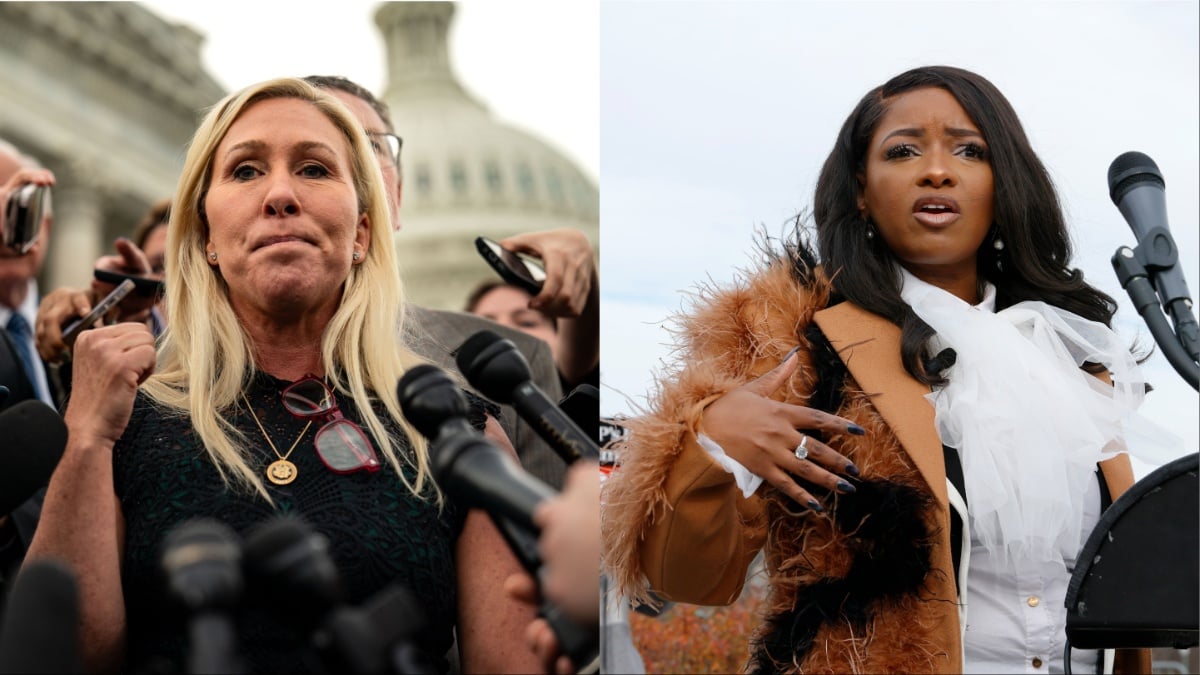Greene's "Bleach Blonde" Meme & Crockett's Response
Has a seemingly innocuous physical description ever sparked a national political debate? The phrase "bleach blonde, bad built, butch body," initially uttered by Representative Jasmine Crockett, ignited a firestorm of controversy, transforming a congressional oversight hearing into a viral TikTok sensation. This unexpected turn of events raises questions about the intersection of body image, political discourse, and the power of social media in the digital age.
The exchange between Representatives Crockett and Marjorie Taylor Greene, occurring during a hearing on the January 6th Capitol attack, rapidly escalated. Crockett's description of Greene, intended as a pointed critique, became fodder for memes, remixes, and online discussions about gender, appearance, and the appropriateness of such commentary within the political sphere. Greene's response, which included sharing her workout routine on social media, further fueled the flames, drawing both support and criticism from across the political spectrum.
| Name: | Marjorie Taylor Greene |
| Born: | May 27, 1974 |
| Political Party: | Republican |
| Office: | U.S. Representative for Georgia's 14th congressional district |
| Education: | University of Georgia (BBA) |
| Previous Career: | Businesswoman, Fitness Coach |
| Reference: | house.gov/representatives |
The incident highlights the increasingly blurred lines between personal and political in the age of social media. While physical appearance has historically played a role in political perceptions, the speed and reach of online platforms amplify such commentary, transforming it from whispered asides into public spectacles. The "bleach blonde, bad built, butch body" narrative quickly transcended the confines of the hearing room, becoming a trending topic on platforms like TikTok, where users generated a wave of content ranging from satirical memes to musical remixes.
This incident also underscores the double standard often applied to women in politics. While male politicians are rarely subjected to the same level of scrutiny regarding their physical appearance, women are often judged and criticized based on how they look. The intense focus on Greene's body, regardless of one's political affiliation, raises questions about the fairness and relevance of such commentary in assessing a politician's qualifications and effectiveness.
The "bleach blonde, bad built, butch body" controversy also speaks to the evolving nature of political discourse. The phrase, initially used in a derogatory manner, was quickly reclaimed and reappropriated by some online communities. This act of linguistic rebellion highlights the power of language and the ability of marginalized groups to subvert and redefine terms traditionally used to denigrate them.
Beyond the political implications, the incident touched on broader societal anxieties surrounding body image and self-perception. Greene's decision to respond by sharing her workout routine sparked conversations about the pressure women face to conform to certain beauty standards, even within the context of a political debate. Some viewed her response as an act of defiance, while others criticized it as further perpetuating unrealistic body ideals.
From a linguistic standpoint, the phrase itself is fascinating. The alliterative quality and stark imagery contribute to its memorability and impact. Its virality demonstrates how seemingly simple phrases can become cultural touchstones, reflecting the zeitgeist of a particular moment in time.
The incident prompted reflection on the role of humor and satire in political commentary. The creation of memes and remixes, while seemingly trivial, can serve as a form of social critique, allowing individuals to express their opinions and engage with complex political issues in a more accessible and engaging manner.
The "bleach blonde, bad built, butch body" saga, while originating from a single comment during a congressional hearing, ultimately became a multi-faceted cultural phenomenon. It highlighted the interplay of politics, social media, body image, and language in shaping public discourse. The controversy serves as a reminder of the power of words, the unpredictable nature of online trends, and the ongoing evolution of political engagement in the digital age.


